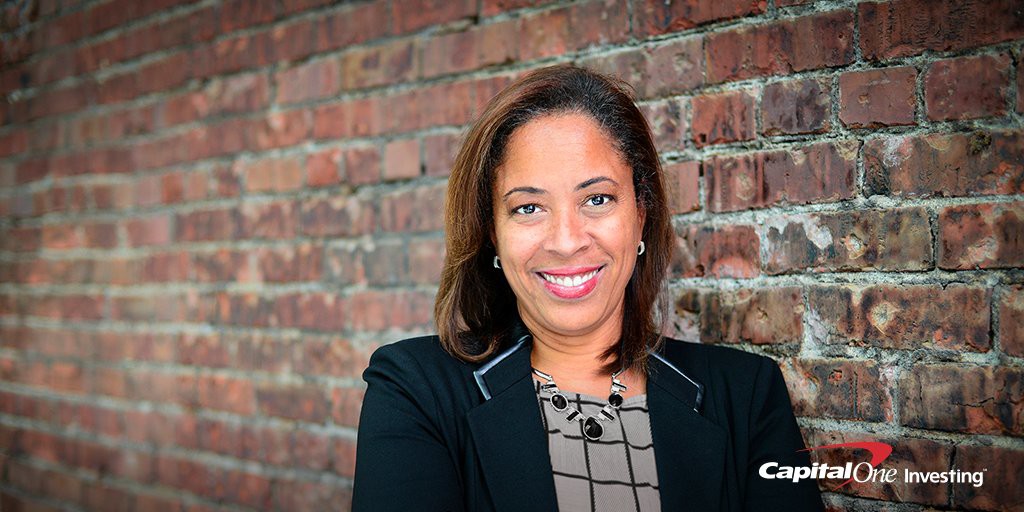We’re back with another Mompreneur Diaries (Working Mom Edition) series sponsored by Capital One. Today’s working mom is Yvette Butler, the President of Capital One Investing. Before joining Capital One, Yvette served in leadership positions at Wells Fargo Advisors, E*TRADE and Merrill Lynch to name a few. She earned her Bachelor of Science in Finance & Management Information Systems from the University of Virginia and her MBA from the Stanford Graduate School of Business. Among her many accolades, she’s a proud wife and mother who talked with us to shed light on how she navigates her life as a career woman and how she brings those learnings home to her own family and community.
Describe your role at Capital One as the President of Capital One Investing.
At Capital One Investing, we’re committed to offering the best of digital innovation and human advice so more Americans can access an unbiased, straightforward approach to financial planning. We’re democratizing investing so it’s accessible for all Americans – our recent Financial Freedom Survey found less than two thirds (62 percent) of Americans feel confident they’re saving enough to retire comfortably, and we think delivering cutting-edge tool and unbiased advice can help consumers feel empowered to reach their goals. To be successful, we need to hire, empower and promote a diverse group of employees to bring a broad range of perspectives to the table. Fostering a great culture and workplace that encourages entrepreneurship and diversity is a core part of my job.
You were an entrepreneur as a young mother – tell us about that. What was your motivation behind starting your own business?
In the late 90s I took the plunge and started my own RIA (Registered Investment Advisor firm) focused on serving women. Many of my clients had done nearly everything right – they saved for their children’s educations and provided financial stability for their families – but they failed to plan for their own financial future. As women, we often put ourselves last, which has serious consequences for retirement planning since the longer you wait the less time you have to grow your nest egg.
Looking back, that was a wonderful period of time. Helping women articulate and reach their goals was gratifying, and working for myself provided an outlet for the entrepreneurial fire burning within me. The Internet had just started revolutionizing what was possible for start-ups, giving me the flexibility to balance my career and parenting responsibilities. Eventually, an incubator bought the RIA (I stayed on as president) but once the Dot-Com Bubble burst I returned to a national brokerage. But I’ve continued to bring that entrepreneurial passion to my work within larger companies, and to this day I’m dedicated to delivering customer-centric products and services so more consumers can feel secure in their future.
What lessons have you passed on to your kids about investing, its importance and how to do it?
We stress to our children that money has three buckets – our wants, our needs and our broader responsibilities. While you need all three elements to feel fulfilled, the desires that many young people have (the flashy sneakers, the car or bike) must be balanced with investment in their education and giving back to the community.
We often talk to our kids about what money can and can’t buy. Yes, it gives you more choices and the ability to act independently, but it can’t buy a joyful, fulfilled life – that comes from the relationships you foster and the impact you have on the people around you. I love the saying, “people may not remember exactly what you did, or what you said, but they will always remember how you made them feel.” Regardless of our economic situation, we all have the opportunity to touch and inspire those around us.
What type of career advice would you give to a working mother looking for work/life balance?
I think about work/life balance similarly to how I think about financial freedom – it means different things to different people, and it can look very different at each life stage. My advice would be to consider your priorities and values. Don’t assume someone else’s values or approach will be right for you. It’s important to understand we all have our own version of what it means to be a working mother.
What are the top mistakes made by communities of color regarding investing*?
While many people in our community are committed to saving for college and retirement, I’ve noticed there’s a reluctance to go a step further and build a financial legacy to support future generations. I’d love to see more people of color establish multi-generational wealth strategies that benefit their children and grandchildren. It’s such a worthy goal that can give young people a leg up and set them on the right path early on. Don’t let fear dictate your strategy, prompting you to not participate in the markets. If fear or a lack of confidence is holding you back, find an unbiased financial advisor to help you build a plan that matches your appetite for risk and investing timeframe. If you have access to an employer-based retirement plan, try to max out your contributions (especially if your employer offers a match).
What are some important investing tips that you can provide for the LoveBrownSugar audience*?
We encourage everyone to build a financial plan that’s right for them, but before you start investing, make sure you’ve put away six months of emergency savings. Then you can think about ways to start investing a portion of your everyday budget. You may want to consider setting up an automatic investment plan that leverages dollar-cost averaging and allows you to invest a set amount on a regular basis. A little can go a long way – for example, buying a premium cup of coffee twice a week totals $500 a year, so putting away incremental amounts on a regular basis can be a critical first step and it may build over time.
Describe the importance of STEM education for girls and people of color.
So many girls and people of color are opting out of science and math because they’re not exposed to role models they can relate to, and for that same reason they aren’t pursuing finance. The financial planning industry needs more women and people of color, but a lack of math and finance education limits their options. Media is incredibly impactful in helping us realize the multitude of professions open to us, and films like “Hidden Figures” has played such an important role in increasing awareness of the false limitations projected on women of color. We need to see and hear more of these stories to communicate to young women they can pursue any path they want.
Why is Capital One a great place to work?
Capital One asks its associates to dare to dream and disrupt the status quo, so consumers can interact with their money in smarter ways. This isn’t your average financial services job and it’s refreshing to work alongside passionate entrepreneurial-minded colleagues who are focused on leveraging digital technology to create new tools that support Americans as they plan for their financial futures. I love knowing that every day I will be inspired, and inspire others. In fact, others are taking notice of our innovative and inclusive culture, including Fortune, which recently ranked Capital One #17 on their 100 Best Companies to Work For 2017 list.
*This material is intended only as general information for your convenience and should not in any way be construed as investment or tax advice by Capital One Investing. You should consult with your financial professional and discuss your specific situation.
This post is sponsored by Capital One. All opinions expressed above are my own and not those of the company.



